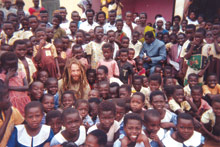There’s no shortage of disease and poverty in Africa. But for Christopher Keiser-Liontree—co-founder of Motherland International Relations—there’s another way to see the continent.

“It’s true that there’s a lot of suffering, but we’re shining a different light,” Keiser-Liontree says. “We’re focusing on the richness of the culture and life in Africa. And we believe in the power of renewal through a collaborative spirit.”
It’s an educational mission in the broadest sense, nursed by him and his wife, Deborah Kiliru-Liontree, out of a tiny home office in Black Mountain. Each has a full-time job, but they’re also both devoted to “shining light on the Pan-African struggles and successes,” says Keiser-Liontree. Christopher is camp director with teenagers in foster care at Under 1 Sky. Deborah is service learning program coordinator at Warren Wilson College.
The nonprofit got its start 10 years ago and has been doing a variety of work ever since. In Ghana, Motherland International Relations facilitates groups in work that includes African history and service projects that take advantage of local materials, such as the neem tree for building and coconut fiber for roof shingles.
In Ethiopia, the organization’s key goal is building relationships between the diaspora pan-African community and local Ethiopians, and working with the repatriation community in Shashemene.
Keiser-Liontree grew up in Greensboro and received a Quaker-based education at Guilford College. There, he says, he learned that “during the days of physical-bondage slavery, it was the Quakers’ sitting in silence that led their conscience to say that human slavery was not right.” That, in turn, led to their involvement in the Underground Railroad. Keiser-Liontree sees Motherland International’s work “as a continuation of this network to support remembering the dismemberment of Africa and her people.”
The nonprofit’s other projects range from establishing resource centers in Ghana and Ethiopia to meeting with a range of officials and community representatives—from Muslims and Rastas to native chiefs and university professors—to continue making connections among people. Keiser-Liontree say he’s planning on taking an international group of about 10 people to Harar and Shashemene, Ethiopia, in October. At home, Keiser-Liontree and his wife (who grew up in Kenya) visit local schools to teach children about Africa.
All the work is done within the limits of a small budget and the couple’s busy schedule, he says. A key source of scholarship funds has been the popular Roller Reggae events at Swannanoa’s Tarwheels Skateway, which combined live reggae music and roller skating. But that revenue stream dried up about a year ago, Keiser-Liontree explains, when Tarwheels stopped hosting the events.
“When one door closes, another one opens,” he notes philosophically. “The over-ground railroad to the motherland is our calling. We’re not ever giving up, but it’s one step at a time.”
Info: Motherland International Relations, 11 Tom Brown Road, Black Mountain NC 28711 (581-0169; www.motherlandinternational.org).



Before you comment
The comments section is here to provide a platform for civil dialogue on the issues we face together as a local community. Xpress is committed to offering this platform for all voices, but when the tone of the discussion gets nasty or strays off topic, we believe many people choose not to participate. Xpress editors are determined to moderate comments to ensure a constructive interchange is maintained. All comments judged not to be in keeping with the spirit of civil discourse will be removed and repeat violators will be banned. See here for our terms of service. Thank you for being part of this effort to promote respectful discussion.